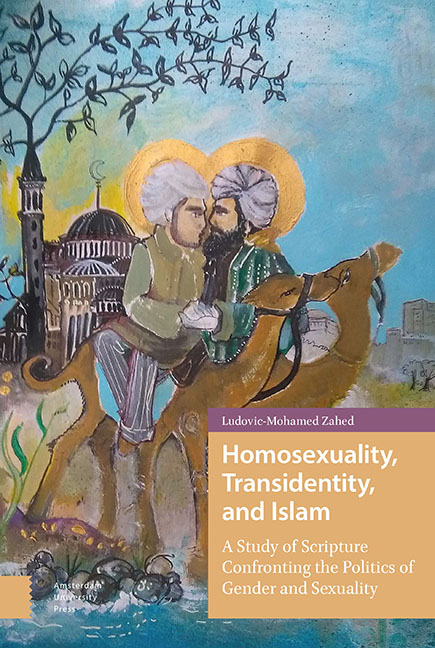 Homosexuality, Transidentity, and Islam
Homosexuality, Transidentity, and Islam Book contents
- Frontmatter
- Contents
- List of Figures
- Acknowledgments
- Foreword
- Introduction
- I The Qur’anic Ethics of “Nature”: Gender, Sexuality, and Diversity
- II Distressing Qur’anic Verses?
- III The Prophet: A Living Incarnation of Qur’anic Ethics
- IV Islamic Apocrypha Advocating the Stoning of “Sodomites”
- V Postcolonial Orientalisms
- VI “Abnormals”: From Cultural Diversity to Dogmatic Uniformity
- VII Towards a Structural Reevaluation of Cultural Values
- VIII Pan-Arabist Literary and Identity Censorship
- IX Orientalist Shi’ism and Literary Homoeroticism
- X Homonationalism and Performative Sexual Categorization
- XI A “Crisis” of Categories, Geopolitics or Civilization
- Conclusion
- Afterword
- Bibliography
- Index
VIII - Pan-Arabist Literary and IdentityCensorship
Published online by Cambridge University Press: 20 November 2020
- Frontmatter
- Contents
- List of Figures
- Acknowledgments
- Foreword
- Introduction
- I The Qur’anic Ethics of “Nature”: Gender, Sexuality, and Diversity
- II Distressing Qur’anic Verses?
- III The Prophet: A Living Incarnation of Qur’anic Ethics
- IV Islamic Apocrypha Advocating the Stoning of “Sodomites”
- V Postcolonial Orientalisms
- VI “Abnormals”: From Cultural Diversity to Dogmatic Uniformity
- VII Towards a Structural Reevaluation of Cultural Values
- VIII Pan-Arabist Literary and Identity Censorship
- IX Orientalist Shi’ism and Literary Homoeroticism
- X Homonationalism and Performative Sexual Categorization
- XI A “Crisis” of Categories, Geopolitics or Civilization
- Conclusion
- Afterword
- Bibliography
- Index
Summary
Abstract
This chapter addresses the consequences of thefascization of postmodern Arab-Muslim identities,which is visible through the nature ofintellectual productions, and still influences thevery core of European Muslims’ mainstreamideologies.
Keywords: Pan-Arabism, literature,censorship
A major consequence of the fascization of postmodernArab-Muslim identities, which still influences thevery core of mainstream European Muslim ideologies,can be observed through the nature of intellectualproductions. Indeed, after the modern era, there isa correlation – or a unidirectional causal link –between censorship and the crisis of identity,especially sexual identity. In 1925, for example, atextbook on the history of Arabic literature,designed for use in secondary schools in Egypt,proclaimed for the first time that love poetry aboutmale youths was “a crime against literature and asource of shame in the history of Arabic poetry”(Al-Zayyat, 1925). Before this, Victorian moralityhad forbidden in most European countries thepublication of such licentious works, especiallypassages dealing with male homosexuality, alreadyconsidered in Europe as “levice contre nature” (Burton, 1886).
Arab-Muslim libertinism was perceived to be the mirrorimage of European puritanism. Arab-Muslimintellectuals who visited Europe, and France inparticular, were astonished that these Europeanpeoples resembled “Bedouins and their lack ofpredilection for the love of male youths or for thewriting of songs about them.” French translators ofArabic love poetry about male youths would oftenchange the object of these poems to being aboutyoung women. However, Joseph Pitts, an Englishnavigator who was captured and sold as a slave inAlgiers before escaping fifteen years later,remarked the following upon his return toEngland:
And yet this horrible Sin of Sodomy is so farfrom being punish’d amongst them, that it is partof their ordinary Discourse to boast and brag oftheir detestable Actions of that kind. Tis commonfor Men to fall in Love with Boys, as tis here inEngland to be inLove with Women. (2010, p. 26)
Similarly, the French traveller C. S. Sonnini, whovisited Egypt between 1777 and 1780, noted thefollowing:
The unnatural passion […], the inconceivableinclination which has dishonoured the Greeks andthe Persians of antiquity, constitute the delight,or, more properly speaking, the infamy of theEgyptians.
- Type
- Chapter
- Information
- Homosexuality, Transidentity, and IslamA Study of Scripture Confronting the Politics of Gender and Sexuality, pp. 75 - 80Publisher: Amsterdam University PressPrint publication year: 2019


